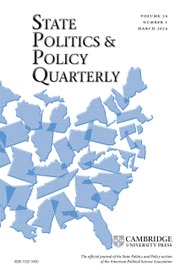Article contents
A Mini-Symposium on Regulation in the States
Published online by Cambridge University Press: 25 January 2021
Abstract
The power and ability of state governments to impose regulations vary according to the state and national politics, policy problems, the nature and power of business and groups, and state institutional structures. Citizens regularly complain about the regulatory reach of the state but often demand state regulation of the environment, consumer safety, industry, insurance, health care, and professions. State elected officials likewise complain about the regulatory reach of the state and, in some cases, work diligently to remove regulations that are thought to hamper industries or that citizens find especially egregious. Sometimes there is disagreement over what constitutes desirable and undesirable regulations. For example, in 2010, the Florida legislature passed a seemingly simple law requiring septic systems to be inspected every 5 years. It was proposed by Republican members of the House and Senate and supported by the state peak homebuilders association, which is a strong interest in a state long dominated by the real estate industry. The then-presiding governor ran unsuccessfully for the U.S. Senate and the incoming Republican governor won the election narrowly with strong rural conservative support. Some of the legislators who had initially signed the previously uncontroversial regulation heard complaints from their constituents regarding the possible cost of mandated repairs and the estimated $150–$200 price of inspections every 5 years. He refused to sign the law, arguing that septic tank regulation is a function best left to county governments. There is no mandatory septic system inspection in Florida, which environmental groups note is dangerous given the state's being situated on top of the Floridan aquifer that provides water for drinking, agriculture, and recreation for the state's citizens and is threatened by leaking septic systems.
- Type
- Introduction
- Information
- State Politics & Policy Quarterly , Volume 15 , Issue 3: Special Issue Title: Regulation in the States , September 2015 , pp. 319 - 321
- Copyright
- Copyright © The Author(s) 2015
References
- 1
- Cited by


